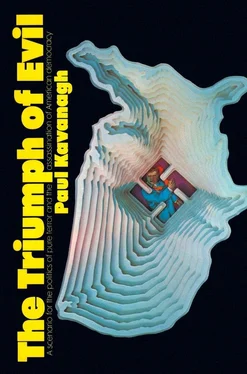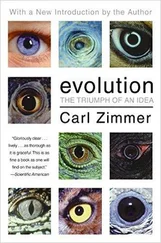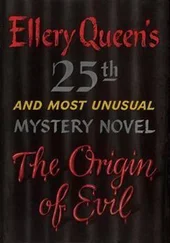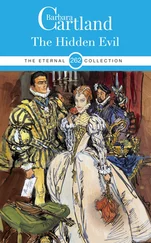A governor, a senator, a labor leader, two mayors. A vice-president. Worms to feed my baby robins. Men to nourish worms.
If you are not part of the solution, then you must be part of the problem.
Monday noon she rang his bell. He was not surprised to see her. He had been expecting her ever since he read the morning paper. “Oh, God,” she said.
She was ashen-faced, trembling. He took her arm. “You know about it.”
“I read about it, yes.”
“I wasn’t supposed to come until tomorrow. If you’re busy—”
“I have a completely free afternoon. Come in.”
“I have the five dollars.”
“You’re being hysterical. Come inside. Now sit down. Would you like anything? Tea? A glass of wine?”
“No,” she said. She took hold of her upper arms, hugged herself, shuddered. She sighed heavily. Then she said, “I’m all right now.”
“Are you sure you wouldn’t like some wine?”
“No.” Her eyes found his face. In German she said, “Your intuition saved my life.”
“Oh, now.”
“Fourteen of them. Dead. Fourteen kids dead. It was never fourteen before. But when it was four at Kent State, everybody said, ‘God, it was never four before.’” She had returned to English. “And thirty-five wounded. One of them was from here. You know that, you saw the paper. What you don’t know was that he was a friend of mine. They didn’t put that in the paper. ‘Jon Yerkes, 20, who was shot through the wrist and is expected to lose the use of his right hand, was a friend of Jocelyn Perry.’ Is a friend. He’s still alive. He just doesn’t have a right hand any more. He played the guitar. Played. Not plays. You need two hands to play a guitar. God, I can’t relate to that. I was up all night. We were all up all night. Kids went around smashing windows because they couldn’t think of anything else to do. Nonviolent kids went around the campus smashing windows. I can’t relate to any of this. Look, Ma, no hand. Oh.”
She got to her feet. “I said I was all right. I’m not. I think I have to throw up.”
Was it one of Heidigger’s? Or did it just happen?
A confrontation. Students and National Guard. Some students broke the demonstration’s nonviolent code, shouted insults, hurled rocks. (Student radicals? Or plants?) A couple of guardsmen used their rifle butts on demonstrators. (Because it was necessary? Because they couldn’t take the pressure? Or because they were following private orders?) More students responded with rocks. A shot was or was not fired from the crowd. (Was there a shot? Was it a student who fired it?) A guardsman fired a shot in return, killing a student. Then there was definitely gunfire from the crowd, from several points in the crowd, and the guard returned fire. Fourteen students dead, dead. Thirty-five wounded. Look, Ma.
It could have happened by itself, Dorn knew. As it had happened before, as it would happen again. Spontaneously, a flash flood, a fire in a hayloft.
Or it could have been handled by three men after a scant hour’s planning.
Which?
He didn’t know that it mattered.
“I might have been standing next to Jon Yerkes. We would have been together. I could have been between him and that bullet.”
“You could have stayed here and walked in front of a bus. Don’t torture yourself with hypotheses.”
“I can think you saved my life if I want to.”
(“Then I owe you my life, Eric. Eh?”)
“I found the different reactions of public officials interesting,” Dorn said. She was calmer now. They had chatted in German about assorted trivia. She had looked at the baby robins — it was surprising how quickly they grew — and accepted a cup of mint tea. “It interests me how everyone prominent has something to say, and how they can all find such different lessons in the same incident.”
“Like the President,” she said bitterly. “Our great leader. ‘We must all work together to repair this tragedy. There must be mutual disarmament. Students must not throw rocks, and the Brownshirts must use smaller-caliber rifles.’”
“And the Vice-President.”
“Sweet old Theodorable. According to him, this proves that protest is self-defeating. In other words, if somebody’s jumping up and down on your back, you’d better lie there quietly so you don’t get him really mad. Oh, God, I hate that man. When I see him on television I want to kick the screen in. Somebody ought to put a bullet through that head of his.”
He started. “Do you mean that? Or is that rhetoric?”
“I don’t even know.” Frowning, “I’m nonviolent. I mean I’ve always been nonviolent. I don’t like window-breaking or any of that. I mean, how can you protest violence by hurting people? But I keep feeling myself going through changes. It’s weird, like I’m being led through things. That man is tearing the country apart, and the more he does it the more the idiots applaud. I think he’s a dangerous man. I think — I don’t know.”
“And yet the Vice-President sounded moderate enough compared to Governor Guthrie.”
“That rotten fascist bastard.”
“Did you hear what he was quoted as saying?”
“I don’t think I want to hear. I can imagine. Oh, tell me.”
“I won’t get the words right, but the essence was that if any Red anarchist hippie niggerlovers tried that sort of thing in Louisiana, it would be the last time any of those hands had the life to pick up rocks.”
“He actually said that.” It wasn’t a question. “The son of a bitch.”
“And he added something about machine guns.”
“Oh, I hope somebody gets him,” she said. “I’m not that nonviolent. I think it would be worth dying, to get someone like Guthrie first.”
“Of course, there were other voices, too. Several senators called for an investigation of the guard’s role. And there was one senator, I think from New Hampshire or Vermont, I can’t remember his name.”
“You mean Drury? The White Hope?”
“Is that what they call him?”
“I don’t know. Some people do.”
“I thought he put things very well. He said that dissent could not be repressed, but then he took it a step further. He said neither could dissent be ignored. That dissenting elements in our society had to be accommodated not only for their sake but for the sake of society itself. What’s the matter? You look enormously unimpressed.”
“I don’t know. Oh, shit, what good does it do? He’s been saying that for years. Each time something happens he says it and each time it’s true and each time everybody claps and each time nothing happens, and now J. Lowell Drury is up there again saying get out of Vietnam and stop the pollution and stop killing the Panthers and the students, and the only difference is that last time Jon Yerkes had two hands and this time he has one.”
“I wonder, then. Doesn’t a man like Drury do any good at all?”
“I don’t know if he does or not.” She nibbled at a fingernail. “What a lot of people say, what they’ve been saying all along, is that someone like that does more harm than good. Because he’s on your side, you know, he really is, it’s not bullshit, he means it. And he’s part of the system. And what he says and does makes people think maybe there’s hope working through the system.”
“And there isn’t?”
“Well, is there? The Democrats wouldn’t nominate Drury, and if they did, he wouldn’t win, but suppose he did. So he takes office, J. Lowell Drury of New Hampshire, and the first day the generals take him aside and whisper in his ear, and the next day the businessmen take him aside and whisper in his ear, and if he’s lucky the CIA takes him aside and whispers in his ear, and like he’s part of the Establishment and he can’t turn his ear off when these people whisper in it, and so the third night he goes to bed in the White House and when he wakes up in the morning he’s not J. Lowell Drury anymore, he’s Hubert Humphrey.”
Читать дальше












